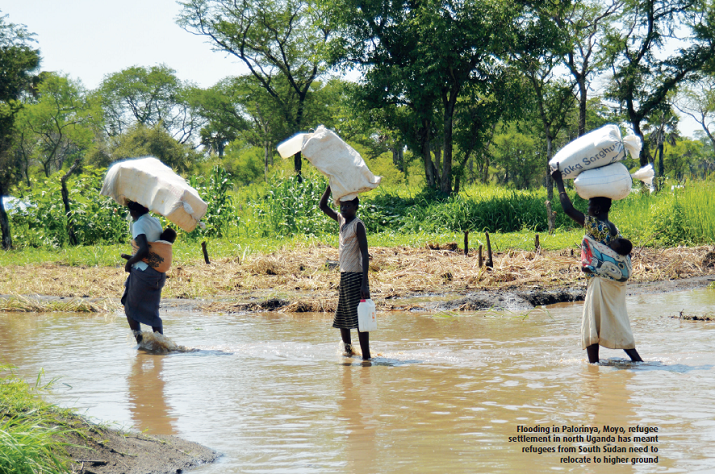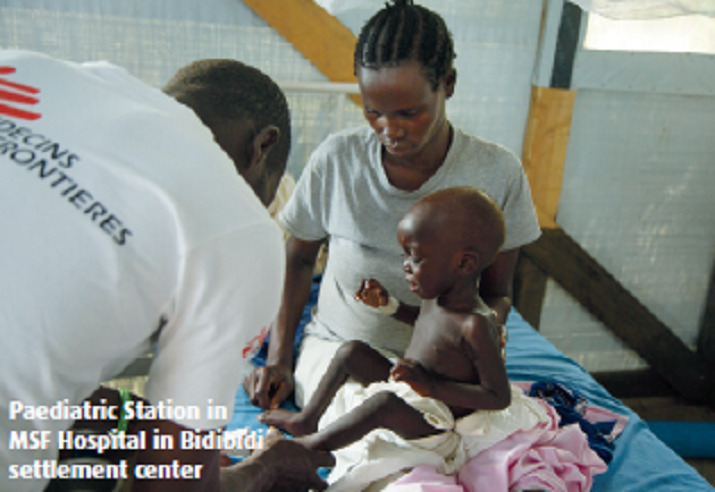|
||||||||||
| Home Nation World Business Opinion Lifestyle ChinAfrica Multimedia Columnists Documents Special Reports |
|
||||||||||
| Home Nation World Business Opinion Lifestyle ChinAfrica Multimedia Columnists Documents Special Reports |
| Africa |
| Shelter from the Storm |
| Uganda is now the largest host of South Sudanese refugees, providing a new life for those who make it across |
| By Aggrey Mutambo | VOL.9 December 2017 ·2017-12-11 |

Photos by MSF
The numbers are ever-changing, said Wilson Févrin, from Catholic Relief Services, an international humanitarian agency in Yumbe in north Uganda. Févrin has been working here for as long as the South Sudanese refugees started coming in, fleeing violence back home.
On this day, his fact book reads like a counting machine at a fuel station: 9,636 individuals, of which 7,601 are refugees, received safe water supply, 18 liters a day. Another 2,000 refugee households received soap and a jerry can; 1,092 women refugees in reproductive age received reusable sanitary pads and soap, and so on.
His notes, classifying beneficiaries from Zone 1 to 5, indicate that 740 households with latrines have been provided by his organization and the entire group of refugees are benefiting from safe water.
"These numbers change. They increase on a weekly basis," he told ChinAfrica.
"We are offering water, sanitation hygiene, shelter and livelihoods to these people. It is the best way we can."
Yet Yumbe is not what you think of a refugee camp. There are no tents, no barbed wire fencing to isolate refugees from host communities and there is no restricted movement. Folks mingle freely at school or at market centers.
Settlements not camps
This type of lifestyle defines most of the centers for refugees in Uganda. Government officials rarely use "camp" in their vocabulary. They call them refugee settlements. Such settlements can also be seen in places such as Bidi Bidi (Yumbe), Moyo, Arua and Adjumani.
"We have experience of what it means to be refugee," explained Apollo Kazungu, Uganda’s Refugee Commissioner who is based at the Office of the Prime Minister.
"Apart from the legal obligations anchored in our own laws and [those of] the UN, we mostly see them [refugees] as an opportunity rather than a threat," he added, indicating this tradition has been here for the last 50 years or so.
All of these settlements and others host more than 1 million South Sudanese refugees according to the UN Refugee Agency (UNHCR), making Uganda the largest host of these refugees on earth. Over 85 percent of these are women and children. Some of them arrived not knowing where they were headed.
One 34-year-old man fled from Yei inside South Sudan, with his three daughters and three sons in tow, after gunmen attacked his village. "We spent 45 days on the road," said the man only named as MB, according to records provided by medical charity group Médecins Sans Frontières, to protect his identity. Eventually, he arrived in Uganda barefoot, and separated from his wife.
Another one, a woman who wished to remain anonymous, said she decided to take her six children and flee South Sudan, walking for six days, crossing into neighboring Democratic Republic of the Congo before eventually reaching north Uganda. "There is hope for life here," she said.
Yet in spite of the tales each of the refugees has, Uganda has offered a safer sanctuary for all these homeless.
Opportunities for refugees
Not that Uganda is rich by any standards. The World Bank notes that about 7 million people of its estimated 35 million are poor, another 14.7 million rely mainly on weather-dependent agriculture and could easily recline into poverty whenever rains fail.
"Uganda's refugee policy guarantees freedom of movement as well as engagement in economic activities," Joyce Wayua Munyao-Mbithi, a senior official at the UNHCR, told ChinAfrica.
"UNHCR and partners provide education opportunities to refugees, including tertiary possibilities, supports refugees in skills development and livelihood activities. This empowers refugees to benefit from the Ugandan policy on refugees and contribute to the economy. It can fend for themselves in the same way as their hosts."
In Uganda, all refugee families are given small plots of land, measuring 30 square meters when they arrive. There, they can erect temporary houses and grow food crops. They are allowed freedom to move within the country and their children access the same schools that locals do. The idea, Munyao-Mbithi explained, allows them to be self-reliant in a short space of time, and perhaps cut off the dependency on aid.
This tradition is buoyed by the experience of senior government officials, as Uganda itself fought a civil war for decades, ending in 1986 when President Yoweri Museveni took power.

Funding still needed
Yet it is not always rosy. The UNHCR says it has been receiving an average of 1,800 refugees every week into Uganda, meaning this welcoming approach could easily fail if no more donor funding is found.
"Our kind of hospitality depends, certainly, on sustainable funding to give them education and something to start with," said Kazungu who indicated only 40 percent of last year’s pledge of $250 million from the international community was sent in.
"We are committed to opening our borders for refugees. But the international community has an obligation to provide resources so these people can regain their dignity."
In June, Uganda convened a summit jointly with the UN to mobilize global support for South Sudanese refugees. They called it the Uganda Solidarity Summit on Refugees. Donors pledged $357 million against the targeted $1.6 billion. Ugandan authorities will wait to see if those pledges translate to real money.
(Reporting from Uganda)
| About Us | Contact Us | Advertise with Us | Subscribe |
| Copyright Beijing Review All rights reserved 京ICP备08005356号-5 京公网安备110102005860号 |